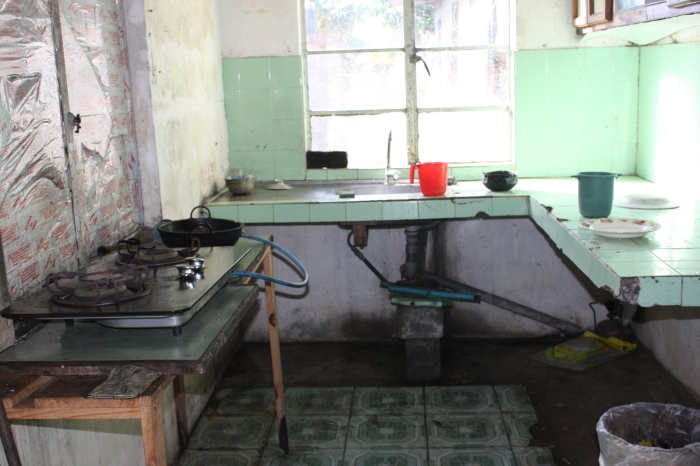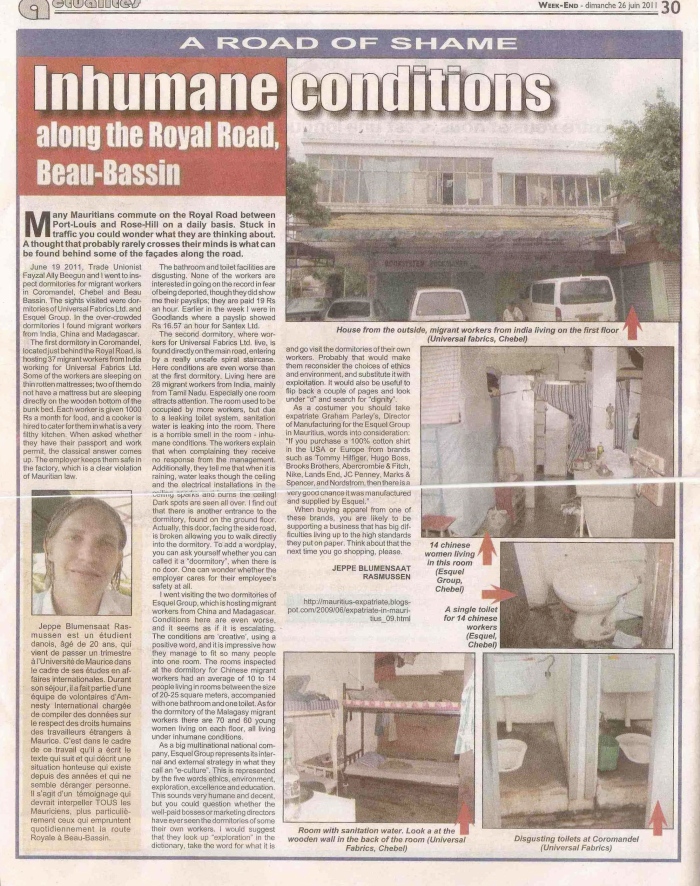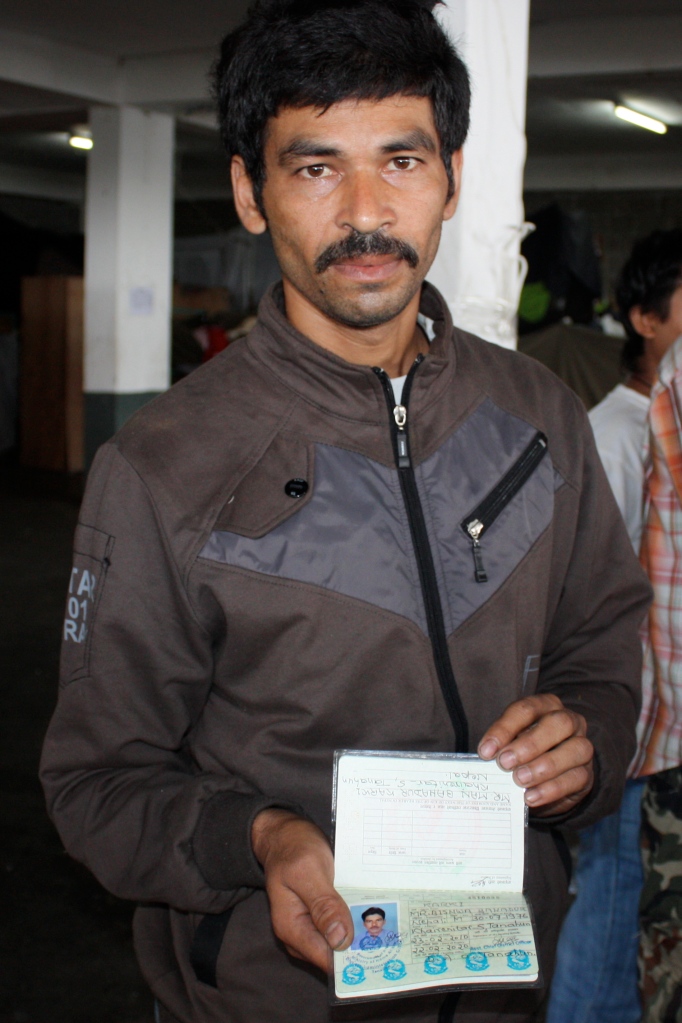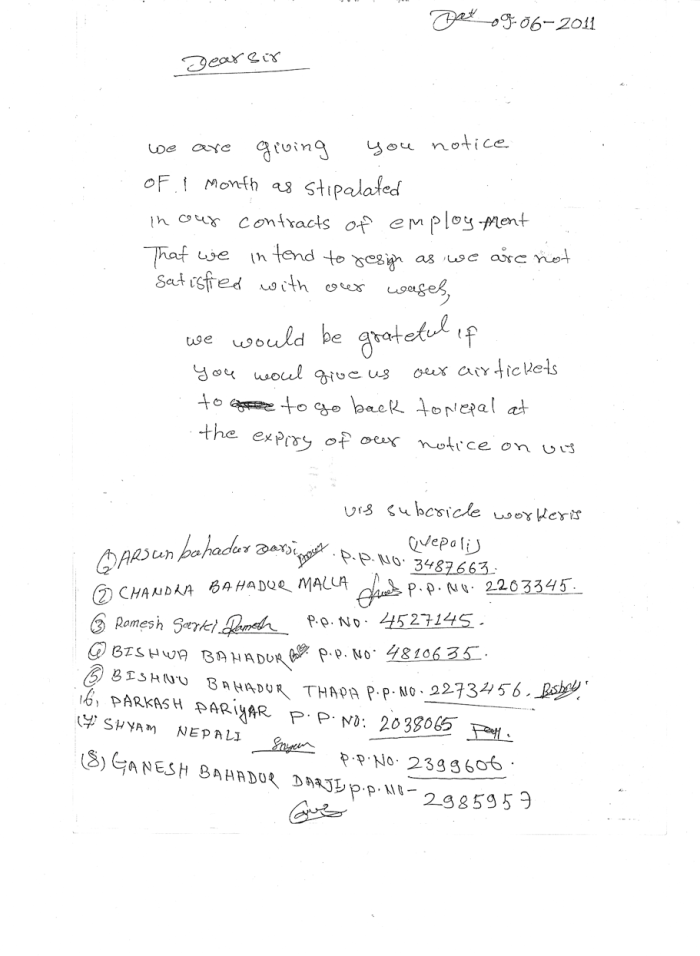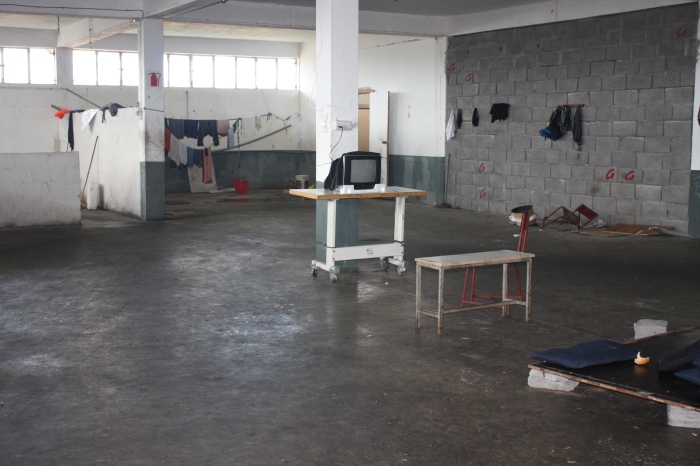How Trend Clothing Ltd. adds to the trend
29 Bangladeshi workers add to the trend of inhumane living conditions.
Contrary to what their name suggests the conditions we saw at two of Trend Clothing’s dormitories were outdated.
On the first visit of Sunday 10th Jeppe was greeted with an atmosphere of desperation. Payslips were thrust, testimonies given and cries of help were banded about the chaotic kitchen by the 19 inhabitants. The hourly rate of just Rs 15.50 (£0.336) is even less than the previous number of Rs 16.57 (£0.337) bringing the record to a new low and allowing for a monthly salary of between Rs 3500 – 5000 (£75.8 – £108.2) depending on overtime. One woman even told us that of the 43 hours overtime she worked, she was paid for only 32. Additionally some of the female workers reported that they had not received any salary for the last three months. A case was opened by the Labour Office in Rose Hill last week under trade union GWF (General Workers Federation) on this issue.
Afterwards the workers took Jeppe for a tour around their dormitory showing several holes in the ceiling and signs of water damage next to the electrical sockets. The risk that the electric wires might catch fire is very great indeed, something which a few workers had tried to minimise by using plastic bags and cartons to plug the holes. We finished the tour with a glance at the one bathroom and toilet facility whose ceiling was rotten.
The next day Annie and Maria Louise encountered similarly de-humanising conditions with their visit to the dormitory upstairs housing 10 Bangladeshi workers. We were shocked to find the bathroom, toilet, washing machine and cooking facilities all crammed into a room of around 12 to 14 square metres, although at least they had been given the luxury of a fridge-freezer. Compared to the first dormitory the general conditions of the rooms were acceptable with roughly two people sharing although there was still a lack of communal living space for the workers to use during their valuable free leisure time.
This account of our visit is aimed at improving the experiences of those few individuals suffering from the sub-standard conditions witnessed. We hope the complaint at the Labour Office will help with this as well.
 Panoramic view of the two dormitories and the neighbour, showing the contrast.
Panoramic view of the two dormitories and the neighbour, showing the contrast.

Health-threatening electrical system and water leakages.

Toilet, shower and washing machine in the kitchen.

The outside of the first dormitory, with electrical chords hanging loosely from the roof.
Speech by Jeppe
Here is the speech Jeppe held at the forum this Saturday:
Dear Honorary guests, Amnesty supporters, friends and employees. Thank you all for coming.
For those who do not know me, I am Jeppe Blumensaat Rasmussen. I am a student of Aalborg University in Denmark and I have recently finished an independent exchange semester of political science at the University of Mauritius. I joined Amnesty International Mauritius Section 2moths ago where I am a full-time volunteer.
Before telling you about the preliminary research, I would like to thank all the people who have taken the time to meet and advice me on migrant workers’ rights in Mauritius. Of course also a special thanks to Amnesty International Mauritius Section for giving me the opportunity to research this very important issue.
Before presenting my findings, I would like to inform you that research on migrant workers’ rights in Mauritius is a very complex topic. The empirical data that I have collected has shown no major independent work has been done on this topic, apart from some academic articles from sociology scholars such David Lincoln of University of Cape Town and Ramola Ramtohul of University of Mauritius, plus various dissertations by students at UoM. I would like to thank Ledikasayon Pu Travayer for granting me access to their internal library, from which I was able to gather press cuttings on the topic dating all the way back to the seventies.
I approached my research from three different angles. As already mentioned I have collected a huge quantity of empirical data ranging from press cuttings, academic articles, dissertations from UoM, government publications, letters, and various documents from international organisations. – A sample of the collection can be found in the blue folders over there which I encourage you to take a look at after the forum has ended.
Secondly I have conducted detailed field research, meeting with people with wide ranging views and experiences of migrant workers rights and conditions in Mauritius. Since this is a somewhat sensitive topic I opted for a primarily passive role in the meetings so as not to cause insult or influence people’s accounts. This also reflects my own opinion that I do not have the authority to engage in a deeper discussion without listening and learning about the process first hand.
Thirdly, and probably the most crucial and difficult part of the preliminary research, has been visiting dormitories and migrant workers. I have therefore decided to focus my speech on this.
I had been warned several times of the difficulties I might face when carrying out the visits to dormitories, the details of which I have chosen not to mention, nor will I name specific company’s in this speech. I would rather focus on the conditions witnessed.
Until yesterday I had visited 650 migrant workers in 16 different dormitories. That is 2 % and 3 % respectively, of the migrant worker population according to the Ministry of Labour’s monthly bulletin May 2011 and by the Parliamentary debate of July 5, 2011 in PQ B/638.
Yesterday I was accompanied on a controlled visit to a large factory by the company’s management team. This large scale inspection will bring the figure up to 5 % of all migrant workers and a little more than 3 % of the dormitories. These stats are quite low, but it is important to take into consideration that site visits have only been done during the last month. I have to tell you that the conditions I have witnessed have been really shocking.
In terms of working conditions, the testimonies of the migrant workers have been very varied, but the general impressions have been that generally working conditions are adequate, although there were some cases of missing security at the factory floor, discrimination, and harassment, or missing salary or missing overtime-payment.
On the other hand what I have seen at the dormitories is a far more pressing concern. Before I tell what I saw, I want to make you fully aware that the cases I have witnessed are some of the worst and I don’t want to make generalisations on behalf of all dormitories. This is merely a sample.
Throughout the visits I witnessed truly dehumanising conditions. Migrant workers are forced into cramped dormitories, often without any cupboards to store valuable belongings. Sleeping facilities are very poor indeed many with missing or rotten mattresses. There is often a lack of toilet and bathroom facilities, and they are mostly unsanitary and a threat to the workers health. Fully working fire extinguishers were missing which is also a real concern. For self catering dormitories there are often huge problems with the kitchen facilities, plus the food allowance given is really low – providing only for minimal and sub-standard nutrition based on staple foods such as rice, flour and potato and almost nothing else. Proper food storage is often missing or broken.
The general impression is that the majority of migrant workers I have visited are unsatisfied with their lodging. Furthermore it is important to note that the migrant workers I have met, rarely have access to their passports, working permit or contract, which is often kept by the company. This restricts their freedom and mobility and is an unacceptable working practice.
I would like to have put more focus on the recruitment and deportation process, but unfortunately I am out of time, hopefully it will be discussed during the panel presentation or question time.
Thank you for your attention, may you all have an interesting afternoon.

Music by Menwar, and the panel.

One of the eight workers who is finally going back to Nepal wanted to thank Jeppe and Maria Louise for making it possible.
FORUM
On Saturday the 16th you are all invited to attend our forum on migrant workers. Meet us at the IFM in Rose-Hill between 14:30 and 16:00 for an informative and interesting day. RSVP on facebook here.
Programme:
14.30 : Welcome address (Michel Ahnee, Chair)
14.35: Objectives of the forum and description (Lindley Couronne, Director)
14.40 : Findings – Preliminary research (Jeppe Blumensaat Rasmussen, intern)
14.50: Testimony
14.55: Speech from Reeaz Chuttoo (The ‘Confederation des Travailleurs du Secteur Prive’ (CTSP))
Speech from Veena Dholah (General Workers Federation)
Questions and answers session
15.25: Musical interlude by Menwar (Move sans)
15.30 : Speech from Satyam Seeboruth, CMT
Speech from Gaelle Angoh, member of Amnesty International
Questions and answers
16.00: Interlude by Henri Favory
16.05: Speech from a representative of the Opposition (MMM)
Speech from the Minister of Labour, Industrial Relations and Employment, Shakeel Mohammed
Questions and answers
16.30 Song by Menwar
Reply to the parliamentary debate
Tuesday 6th of July Mrs L. Ribot raised the parliamentary question No. B/638 with the title United Fabrics Ltd. & Esquel Group – Foreign Workers. The parliamentary question (PQ) was based on the article A Road of Shame, posted on our blog. The participants in the debate was Mrs L. Ribot , Minister of Labour, Industrial Relations and Employment Mr Shakeel Mohamed, Leader of the Opposition Mr. Bérenger, Mr Fakeemeeah, Mr. Obeegadoo and Mr. Uteem. Mr Mohamed comes across as aggressive during the debate, and we feel like we need to make some things clear.
First of all, it has never been our intention to attack the ministry or the government, and it is not our interest either to criticise Mauritius. Our critique should rather be seen as a critique of the multinational companies exploiting migrant workers, which is happening all over the world.
Mr Mohamed starts replying the PQ:
There is no preliminary report yet; all that has been in the media is our personal reporting of the problem. Mr Mohamed continues:
Later in the debate Mr Mohamed says that:
Most importantly, our articles have been a description of what we have seen during the dormitory inspection, not a gross exaggeration of how bad the conditions are. This has, through our blog and local media, been shown in pictures. If the minister wishes, we have more than 600 photos backing us as evidence, as well as videos. The article was originally posted on Maria Louise’s personal blog, and then the media storm started.
Secondly, Jeppe has been here for half a year and did not come with the intention of building a bad reputation of the country. We are both here to understand and experience the Mauritian culture, but when a story like this finds you it would be wrong to let it go. As Mr Mohamed himself states, it is our duty to report that problem.
As Mauritius has an international reputation of freedom of press and freedom of speech, we do not see it as a problem to spread awareness of this through the local media. This was not done to make a big show out of a problem, but rather to help out our fellow human beings in the best possible manner. Our descriptions should be seen as a cry of help from the migrant workers.
We are fully aware of the promulgation of the Occupational Safety and Health (Employees’ Lodging Accommodation) Regulations of 2011, but we will also like to call for a signing of the ICRMW. We are familiar with the fact that that our own home countries Denmark and Norway have not signed this convention either, which is also critical. We are informed about the exploitation of migrant workers in Denmark and the UK (where Maria Louise is residing). Mr Mohamed continues:
If the Minister wants to keep receiving thanks from the International Organisation of Labour (ILO), it might be a good idea to sign convention number 97 and 143.
Mr Mohamed explains:
These 3 dormitories account for over 10% of the labourers of Esquel, so we consider our findings valid. We have never claimed to be researchers, so if the Minister wants to give us that honourable title it is for his own account. Our inspections are done voluntarily, with no economic backing or hidden agendas. We are only able to comment on what we have seen ourselves, and the Ministers’ use of statistics is not enough to cover up these rotten apples.
Documents from Candytex Workers
We went on a dormitory inspection in St. Pierre, Mauritius. The article we wrote about it can be found here. The workers gave us the permission to share what they told us with the public, including photocopies of their passports, work permits, notice to employer and pay-slips.

What used to be a table is now turned into a bed.

Veena Dholah and the workers we met. Here they are talking in the kitchen.

The bathroom. There is a water leakage, so the floor is covered in water. The stick on the floor is to balance on so you don’t get you feet wet.

Bishwa’s passport. He is lucky his boss didn’t take it from him.

His visa, which was granted in a hotel in New Delhi, a third-part country, on his way here.

Payslip showing how Amit is paid 16.57 Rs an hour. That is 0.368 pound sterling an hour!
l’Express yourself
On Friday the 1st of July we had a one-page article in l’express weekly. Although the journalist changed our article slightly, we are happy to reach out to the entire country this way. The original article can be found here.
Modern Day Slavery
What sounds like a sweet company is engaged in some sour business – migrant workers from Nepal forced to stay with Candytex, St. Pierre, Mauritius.
11 months; this is how long it took nine migrant workers from Nepal to realise that Mauritius is not the place for them, due to their working and living conditions.
Together with trade unionist Veena Dholah of General Workers Federation (GWF) we enter into a big factory room; a group of twelve migrant workers from Nepal greet us. They entered Mauritius a year ago, with the hope of providing for their families back home. Ramesh, who worked in the Saudi Arabian textile industry for 8 years, tells us how he enjoyed better working- and living conditions there – a statement that was quite shocking to us. When inspecting the dormitory we understand why.
The dormitory is found on the third floor of the factory building. It looks like an old production space, which now hosts 34 migrant workers from Nepal. There are bunk beds lined up along the walls, separated by hanging blankets and sheets. In the middle of the room there is a small television set, overlooking the open kitchen space and toilet. Imagined being hired as a cooker for 33 people, out of which 31 are machinists, and you neither have a fridge nor a table for preparation. The potatoes are spread around on the concrete floor, and there is no real storage space for the food. There is no water connection in the kitchen, and the one in the bathroom is not functioning. This means they have to carry the water from the ground floor to the third floor – totally unacceptable. The smell from the toilets is horrible, as there is no running water to flush the toilets. Isn’t this a big threat to their well-being? As if this is not enough, they also feel mistreated doing work for the boss’ wife, who is constantly harassing them. The boss is never there.
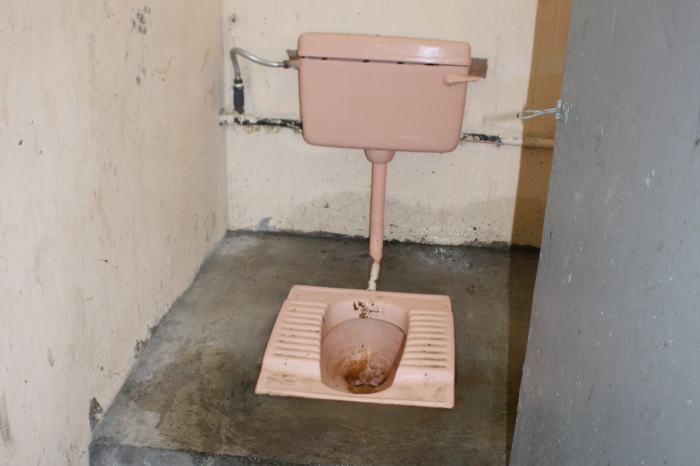
A health-threatening toilet, with a non-functioning water supply.
Ramesh has two children living in Nepal, his 15-year-old daughter Thara and 12-year-old son Rajesh. He phones them once in a while, but it is extremely expensive. It cost him 24,000 Rs (£527) to leave his family, money he had to borrow. His contract is being kept downstairs by the company, which he does not have a copy of, even though this is illegal. He is lucky to have his passport, which is not normally the case. So technically he is free to go back home to his family, but being paid 16,57 Rs (£o,36) an hour, he can not afford the 17,000 Rs (£373) a flight ticket would cost. Ramesh has contacted Nepal’s high commissioner in Mauritius, but he refused to help. He has also contacted the Nepali recruitment agent, Jyoti, regarding the conditions, without any luck. The agent has simply cut him off. What seems even more suspicious is the fact that Ramesh was made to sign his contract in a hotel in New Delhi, a third-part country, caught in between his home and his destination.
The 9th of June eight of the workers wrote a letter to their boss, giving their employer a one-month notice. They have had enough! We are told that other workers are suffering the same way, namely 65 workers from Madagascar experiencing equally bad conditions. So far 40 have left. Furthermore there are currently 26 workers from Bangladesh, however the initial number remains unknown.
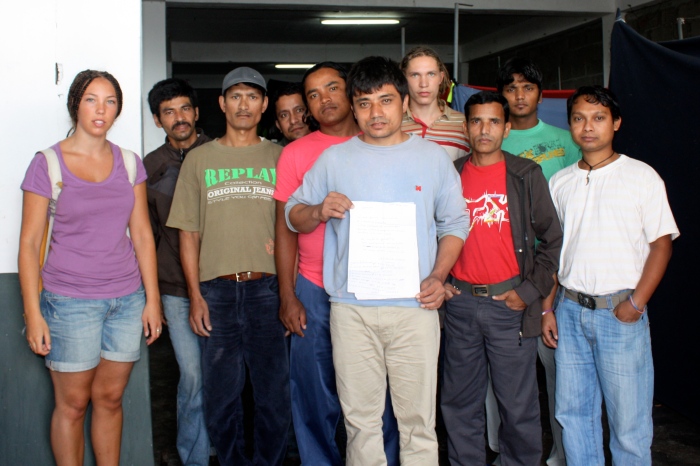
Maria Louise, Jeppe and the workers who want to return to their families in Nepal.
Since September 2010 the workers have not received a meal allowance, and the salary, which has decreased from 5600 (£123) to 5036 Rs (£110)a month, does not cover much. “Even if we are paid 10,000 Rs a month, we will not stay,” he tells us. All this has been really shocking to us; it reminds us of modern day slavery.
A Road of Shame
Inhumane conditions along the Royal Road, Beau Bassin!
Many Mauritians commute on the Royal Road between Port-Louis and Rose Hill on a daily basis. Stuck in traffic you could wonder what they are thinking about. A thought that probably rarely crosses their minds is what can be found behind some of the façades along the road. Amnesty International Mauritius Section went to discover.
June 19 2011, Amnesty International Mauritius Section, together with trade unionist Fayzal Ally Beegun, went to inspect dormitories for migrant workers in Coromandel, Chebel and Beau Bassin. The sights visited were dormitories of Universal Fabrics Ltd. and Esquel Group. In the over-crowded dormitories we found migrant workers from India, China and Madagascar.
The first dormitory in Coromandel, located just behind the Royal Road, is hosting 37 Indian migrant workers working for Universal Fabrics Ltd. Some of the workers are sleeping on thin rotten mattresses; two of them do not have a mattress but are sleeping directly on the wooden bottom of the bunk bed. Each worker is given 1000 Rs (£22) a month for food, and a cooker is hired to cater for them in what is a very filthy kitchen. When asked whether they have their passport and worker permit, the classical answer comes up. The employer keeps them safe in the factory, which is a clear violation of Mauritian law. The bathroom and toilet facilities are disgusting. None of the workers are interested in going on the record in fear of being deported, though they did show us their payslips; they are paid 19 Rs (£0.42) an hour.

The door-less entrance and the home of a Chinese Migrant worker: 1 x 1 x 1,80 meters.
The second dormitory, where workers for Universal Fabrics Ltd. live, is found directly on the main road, entering by a really unsafe spiral staircase. Here conditions are even worse than at the first dormitory. Living here are 28 Indian migrant workers, mainly from Tamil Nadu. Especially one room attracts attention. The room used to be occupied by more workers, but due to a leaking toilet system, sanitation water is leaking into the room. There is a horrible smell in the room – inhumane conditions. The workers explain that when complaining they receive no response from the management. Additionally, they tell us that when it is raining water leaks though the ceiling and the electrical installations in the ceiling sparks and burns the ceiling! Dark spots are seen all over. We find out that there is another entrance to the dormitory, found on the ground floor. Actually, this door, facing the side road, is broken allowing you to walk directly into the dormitory. One can wonder whether the employer cares for their employee’s safety at all.
We went visiting the two dormitories of Esquel Group, which is hosting migrant workers from China and Madagascar. Conditions here are even worse, and it seems as if it is escalating. The conditions are ‘creative’, using a positive word, and it is impressive how they manage to fit so many people into one room. The rooms inspected at the Chinese dormitory had an average of 10 to 14 people living in rooms between the size of 20-25 square meters, accompanied with one bathroom and one toilet. As for the Malagasy dormitory there are 70 and 60 young women living on each floor, all living under inhumane conditions.
Esquel Group’s five E’s – is there a sixth one missing?
As a big multinational national company, Esquel Group represents its internal and external strategy in what they call an “e-culture”. This is represented by the five words ethics, environment, exploration, excellence and education. This sounds very humane and decent, but you could question whether the well-paid bosses or marketing directors have ever seen the dormitories of some their own workers. I would suggest that they look up “exploitation” in the dictionary, take the word for what it is and go visit the dormitories of their own workers. Probably that would make them reconsider the choices of ethics and environment, and substitute it with exploitation. It would also be useful to flip back a couple of pages and look under “d” and search for “dignity”.
As a costumer you should take expatriate Graham Parley’s, Director of Manufacturing for the Esquel Group in Mauritius, words into consideration: “If you purchase a 100% cotton shirt in the USA or Europe from brands such as Tommy Hilfiger, Hugo Boss, Brooks Brothers, Abercrombie & Fitch, Nike, Lands End, JC Penney, Marks & Spencer, and Nordstrom, then there is a very good chance it was manufactured and supplied by Esquel.”(1) When buying apparel from one of these brands, you are likely to be supporting a business that has big difficulties living up to the high standards they put on paper. Think about that the next time you go shopping, please.
(1) http://mauritius-expatriate.blogspot.com/2009/06/expatriate-in-mauritius_09.html
